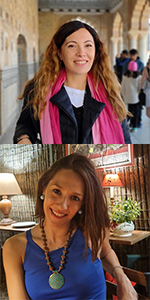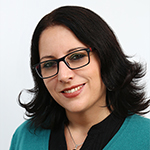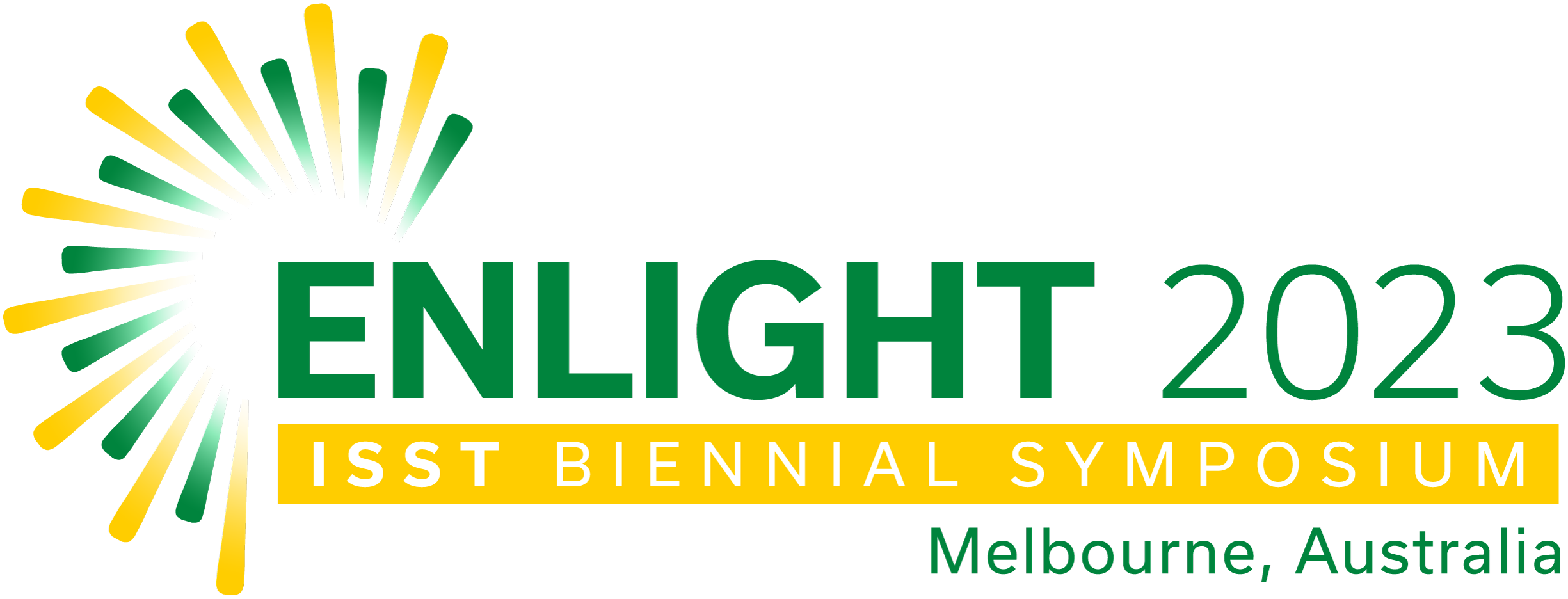Have a look at the session information below by clicking in each of the rooms.
Don’t forget to scroll down to see day 2 and Day 3.
You will also be able to access the presenter’s bios by clicking on their names
- Main Ballroom
- Room 1
- Room 2
- Room 3
- Room 4
- Room 5
- Room 6
Please note 1 or more presenters will be connecting remotely for this session
Abstract

The schema therapy model assumes that maladaptive schemas begin to develop early in life when core emotional needs are unmet. One important core emotional need is the development of secure attachment relationships, especially the extent to which attachment figures provide a sense of safety, understanding, and nurturance. From an attachment theory perspective, when a caregiver is insensitive or unresponsive, an individual is susceptible to developing negative mental views of the self and others and is at increased risk for attachment insecurity. Attachment insecurity, in turn, increases the formation early maladaptive schemas. But what are the developmental pathways through which early life experiences forecast negative mental states and attachment insecurity in adulthood? Drawing on data from the Minnesota Longitudinal Study of Risk and Adaptation (MLRSA), a landmark study of development that has followed individuals from infancy across 45 years of life, we outline some of the major development pathways that that may explain how negative and adverse experiences early in life are prospectively related to the development of insecurity in adulthood. Furthermore, we outline how these insights can inform aspects of the schema therapy model
Abstract

According to its founder, Jeffrey Young, Schematherapy is essentially integrative from its very start. A further step in this evolution is integrating a contextual (or 3rd wave) perspective into a simplified theoretical model in order to lay out in detail, what a Healthy adult mode is exactly doing. Beyond this, we are specialists to understand, balance and modify interpersonal relationship patterns. This includes deconstructing the Schematherapy relationship into its processes within the “therapeutic field” and pointing out the basic positions that we oscillate between (emotional activation reflection, reparenting empathic confrontation). The next step is detecting the micro-processes we use to balance the therapy relationship in a goal-directed way between change and acceptance. The pivotal idea is giving the therapists a clear road map at hand to navigate safely through the sometimes stormy seas of therapy, based on teach- and learnable components.
In this workshop, the participants will get familiar with the theoretical underpinnings and the core processes in Schematherapy. Based on live demonstrations we will practice how to move between the four positions in the therapeutic field and how to basically deal with internalizing and externalizing clients. Furthermore, we will use perspective changes to release and use functional emotions like constructive anger and self-compassion. We will practice empathic confrontation as well as emotionally supporting the clients on different levels in a very intimate and dynamic, but safe way. Participants should be familiar with the basics of the Schematherapy model and the experiential techniques.
Please note 1 or more presenters will be connecting remotely for this session
Abstract

This workshop combines Self-Practice Self-Reflection with new Schema Therapy Deliberate Practice exercises to support therapists building both intervention mastery and their authentic personal style. We will focus on interventions and practice which facilitate mastering the therapist’s “real persona skills” within schema therapy: being present and genuine, being aware of one’s own schema and mode triggering and expressing the internal Good Parent part of the Healthy Adult schema mode. Exercises that facilitate therapist self-care are included. The workshop will employ PowerPoint, demonstration, and role-play practice. It is designed to be theoretical, practical, and experiential.
Learning Objectives:
1. Be able to recognize therapist schema and mode triggering that interferes with connection and attunement
2. Learn how to enhance your genuine in session presence in the role of a Good Parent
3. Learn how to utilize the ST Deliberate Practice model to achieve greater mastery of interventions
4. Developing a posture that allows for therapist intention to match impact on client experience.
Target Audience: Schema Therapists at all levels of experience
This workshop offers practical professional benefit for schema therapists as well as providing opportunities for personal growth and increased self-awareness.
Relevant Readings:
Experiencing Schema Therapy from the Inside-Out: A Self-practice/Self-reflection Workbook for therapists. J. Farrell & I. Shaw, Guilford Press, 2018
The Deliberate Practice of Schema Therapy. W. Behary, J. Farrell, T. Rousmaniere and Alexander Vaz, APA Press, 2022
Mastering the Inner Skills of Psychotherapy: A Deliberate Practice Manual, T. Rousmaniere, Gold Lantern Books, 2019
Abstract

Imagery rescripting is a powerful technique and a central element of schema therapy. The application can be flexible, creative and imaginative to help provide effective change. However, such a flexible technique can be challenging to master (compared to manualised, step-by-step approaches). Micro-skills and moment-to-moment responses can be decisive factors impacting the effectiveness of imagery outcomes. Furthermore, such skills can be challenging to learn without practice and reflection.
This workshop will look at commonly observed difficulties and challenges in imagery rescripting. It will look at the detail in imagery that results in positive therapeutic outcomes. Attendees will develop micro-skills and awareness of fundamental principles that will assist in therapeutic outcomes in imagery rescripting work.
Attendees will use role-play and deliberate self-practice techniques to help prepare and overcome commonly observed challenging scenarios. Furthermore, Therapists will also have the opportunity to reflect on their schemas and how this impacts their use of imagery rescripting.
Learning outcomes
- To develop and refine skills in imagery rescripting
- Assist attendees in developing greater awareness of their own schemas and their impact on imagery work
Develop confidence in using imagery and managing frequently observed challenges and difficulties
Abstract

The Healthy Adult Mode is a key concept within the Schema Therapy model. As schema therapists we strive in therapy to heal the client’s maladaptive schemas through limited reparenting, and throughout this process we simultaneously help the client to establish an elaborate self-reflective capacity in order to integrate expressed modes and to act on core emotional needs in an adaptive way in day to day life. This self-reflective and integrative capacity is known in schema therapy as the Healthy Adult Mode. Although we usually talk about the Healthy Adult as being “one” Mode, it’s actually a set of modes that are characteristic of how a mature, compassionate and psychologically minded person would think, feel and act in a particular situation. The Healthy Adult can be viewed in analogy with a diamond and its various facets. Each facet of the diamond representing a specific healthy adult capacity, but at the same time representing a part of a greater whole. During the past year the Case Conceptualization Committee of ISST has worked on revising the Case Conceptualization form and a new version will be release in 2023. The new revised version has a section on the Healthy Adult were therapists are asked to assess and document the quality of 8 specific Healthy Adult capacities, (see listing below): Meta Awareness; Emotional Connectedness; Reality Orientation; A Coherent Sense of Self; Self-Assertiveness & Reciprocity; Agency & Responsibility; Caring Beyond Self; Hope & Meaning. These 8 capacities should not be understood as a complete list. The CC Committee has selected capacities that are clinically relevant and holds support in the broader literature as important aspects of mature psychological functioning. Each capacity will be thoroughly outlined and discussed during the workshop and there will be clinical examples and role-plays on how each capacity can be established and reinforced in therapy. There will also be a presentation of a clinical worksheet for assessing the quality of each capacity in specific significant life areas.
Abstract

The topic of gender diversity has gained significant momentum in recent years. Many therapists, if they haven’t already, will likely encounter clients presenting with issues pertaining to their gender identity.
This workshop will provide activities to explore and understand the role of gender identity in the therapy context. We will cover how to incorporate gender into both assessment, Schema Therapy formulation and treatment. This workshop will challenge participants’ own ideas of gender (if they have not previously explored their own gender identity). Participants will also learn simple and effective ways to build the therapeutic relationship, a fundamental cornerstone of Schema Therapy. The workshop also highlights how Schema Therapy provides multitudes of tools appropriate for working with Transgender and Gender nonconforming individuals. Therapists dedicated to this modality can adapt their existing knowledge base to work effectively.
Abstract

Overview: This highly experiential workshop will focus on developing skills to access and build the happy child mode in the context of individual schema therapy. The workshop will cover the following:
- Common presentations where development of the happy child is most needed.
- A review of research and academic thought in the field of ‘play’, including a review of the various ways in which we can engage in play.
- A review of ‘play temperaments’ for the purpose of developing individualised and focussed approaches to guiding the expression of the happy child mode.
- Assessment strategies to determine unique play temperaments as well as determine historical and current barriers to play.
- Experiential strategies to access and build the happy child mode.
- Experiential strategies to identify and work with schemas and modes that are inhibiting the expression of the happy child.
- Demonstrations on how we can integrate skills form the field of positive psychology to encourage play and playfulness in our day-to-day lives.
In keeping with the known power of Self-Practice and Self-Reflections to the process of learning and mastery, registrants will be encouraged to participate in skills practice ‘as themselves’ rather than in ‘role-play’. Given that we are aiming to access ‘joy’, rather than painful emotions, the activities are unlikely to be experienced as confronting. Furthermore, participants will be able to choose their level of engagement.
Abstract

The aim of this workshop is to provide experiential techniques for working with the “Military Mode” in the therapy room. The “Military Mode” is a mode specifically developed by the military for military service. This presentation will assist you understand what the “Military Mode” is, how it is developed and important considerations of this mode when military personnel exit the military. Specific Schema Therapy techniques will be provided to assist you address this mode in the therapy room, in order to unlock the Healthy Adult and improve outcomes in the population at transition and after military service. Whilst this presentation is tailored to an Australian Army soldier perspective, it is transferrable to other Defence Forces and services, Police and emergency services.
Abstract

In Schema Therapy, Limited Reparenting, Imagery Rescripting and other wonderful affective, cognitive and behavioural techniques are used to create emotional change and for schema and mode healing. These techniques are also used to help individuals regulate. Whilst for many individuals these techniques are enough to help them lead a more fulfilling and emotionally rich life, there are emotional regulation skills not traditionally taught in Schema Therapy, but taught in other therapy modalities, which can compliment and syngerise our schema and mode work.
In this workshop you will be taught a number of skills from Dialectical Behaviour Therapy (DBT), an alternative-evidence based treatment for borderline personality disorder and other disorders of emotional dysregulation, in order to help with behavioural pattern breaking, increasing the healthy adults emotional regulation skills and to compliment overall mode and schema change work.
At the end of the workshop the presenter will have:
- Introduced Mindfulness with an emphasis from a Schema Therapy perspective including using the skill to defuse from schemas and modes and promote knowledge of the Healthy Adult.
- Taught attendees the Crisis Survival skills from DBT to help support an “overwhelmed” Vulnerable Child mode.
- Taught attendees the STOP skill to help with the Angry Child and to raise awareness of schema / mode activation whilst making Healthy Adult Choices.
- Taught attendees core skills from the Emotional Regulation module of DBT, particularly the skill of Opposite Action which can be used for helping to counter Critic and coping modes.
- Discussed ideas to increase the Happy Child mode and promote more joy
- Discussed how to integrate these skills into Schema Therapy and how some modes / presentations may more readily align themselves with the need for certain emotional regulation skills.
This presenter will do this through a mixture of demonstration, practice and presenting clinical examples of teaching DBT skills in Schema Therapy. This will ensure that your experience and understanding is practical and clinically applicable.
Abstract

Two of the most challenging issues you may face when using schema therapy for couples are affairs and trauma, both of which can undermine the safety and trust of a love relationship. Both affairs and trauma are by far the two leading reasons couples seek therapy together.
Untreated traumas that helped create early maladaptive schemas (EMSs) and modes in one or both partners can infiltrate and consume a relationship dynamic. When past traumas are reinforced by a negative mode cycle, the relationship may teeter on the brink of collapse.
• You will learn to stay open and objective as you assess the destructive mode cycle between partners with traumas and affairs.
• You will develop an effective conceptualization that shapes an effective treatment plan, rebuilding trust and immunizing against future injuries and betrayals
• You will help each partner strengthen their “3-Rs”: the ability to regulate, reflect and respond to each other
• You will help partners process and understand past traumas and injuries
• You will help each partner deepen their bond as they heal traumas and injuries together (schema mode healing)
• You will help partners experience powerful interventions and develop enduring rituals to help avoid relapse
This skill and intervention-focused workshop will start with a brief introduction of how the schema therapy model can improve outcomes for the most challenging issues you face as a schema couples’ therapist, integrating empirically based techniques. You will view digital recordings of key schema mode interventions, and practice role-plays to help your couples rebuild trust in each other.
Workshop Outline:
- Assessing trauma and affairs from the schema mode model
a. Trauma definitions
b. Impact of trauma on PTSD partner and non-PTSD partner
c. Anatomy of affairs
d. Evolving shifts in cultural norms of monogamy
e. Impact of affairs on each partner
f. Creating an accurate conceptualization to inform effective treatment - Treating trauma and affairs
a. Working with emotions, cognitions, behaviors, and the therapeutic relationship - Intervention 1: Connection Dialogues (CD)
- Intervention 2: Chair Work for Couples (CW-C)
- Intervention 3: Imagery Rescripting for Couples (IM-C)
- Relapse prevention
a. Improving relationship satisfaction
b. Relationship Tools:
i. Applying the “3-R’s”
ii. Daily immunization rituals
iii. Honoring dreams of each partner and the relationship
This workshop encompasses the 4th module for coursework toward certification as a schema therapist for couples (6 hours).
- Assessing trauma and affairs from the schema mode model
- Main Ballroom
- Room 1
- Room 2
- Room 3
- Room 4
- Room 5
- Room 6
KEYNOTE- Waking the Tiger, Healing Trauma
Please note 1 or more presenters will be connecting remotely for this session
Abstract

Peter A Levine, PhD, Developer of Somatic Experiencing®
Somatic Experiencing®(SE™), developed by Dr. Levine, is a naturalistic and neurobiological approach to the treatment of trauma and other stress related disorders. SE offers a framework to assess where a person is “stuck” in the fight, flight, fawn, freeze, or collapse responses and provides clinical tools to resolve these fixated physiological states. It offers practical skills appropriate to various healing and helping professions, including medical and mental health providers, first responders, educators, and more.
Trauma can come from many things like war and abuse, but it can also come from a difficult birth, an automobile accident, loss of a loved one, or even an invisible threat that stokes fear. These protective mechanisms can get stuck in the body and many become frozen in the past, unable to be fully present in the here and now, and unable to move forward in life with ease and joy. For some, traumatic experiences may lead to chronic fear, anxiety, and depression, as well as various physical symptoms, like chronic pain, IBS, etc.
During this unique experiential program, Dr. Levine will guide us in how the SE approach gently facilitates the release of thwarted survival energy bound in the body, thus addressing the root cause of trauma symptoms, allowing us and our patients to better manage stressful times without overload, burnout, or regretful transgressions.
• Define how trauma responses are a set of defensive bodily reactions meant to protect us and how they may present in a patient.
• Identify how trauma-based perceptions remain fundamentally unchanged until the internal experience of the body changes.
• Demonstrate various techniques to aid with nervous system regulation.
Abstract

Chairwork has been playing an increasing significant role in Schema Therapy in recent years ((Heath & Startup, 2020; Kellogg, 2015). The discovery of the Four Dialogues in 2018 was significant breakthrough because it provided a powerful and elegant model for effective psychotherapeutic action whether using Chairwork, Imagery, or more conversational forms of clinical encounter (Kellogg, 2018, 2019; Kellogg & Garcia Torres, 2021). The Four Dialogues are: Giving Voice, Telling the Story, Internal Dialogues, and Relationships and Encounters.
Giving Voice involves amplifying and giving expression to a feeling, interviewing a part to better understand it, and/or empowering people to claim power and affirm the decisions that they are making in their lives.
Telling the Story is centered on working with people to express and work through difficult, painful, or secret narratives.
Internal Dialogues involve working with the patient’s inner parts or modes. These chairwork dialogues usually take one of three forms: (1) Polarity Dialogues; (2) Alternative Dialogues; or (3) Mode Dialogues.Relationships and Encounters dialogues are rooted in the interpersonal world, and it involves working with the cycle of emotions—or the expression of love, anger, fear, and grief.
This model provides a framework not only for listening to patients, but also for taking effective action.The goal of this workshop is to empower Schema Therapists to create more powerful Chairwork-based interventions using this framework.
Topics to be covered are:(1) Foundations – An introduction to the Four Principles and the Four Dialogues
(2) Demonstrations and Participant Role-Plays
a. Polarity Dialogue – Resolving Inner Conflict/Making Decisions
b. Challenging Maladaptive Schemas and Problematic Modes
c. Working Through Trauma – Third Person Storytelling
(3) How Chairwork Heals
Please note 1 or more presenters will be connecting remotely for this session
Abstract

One of the superpowers of schema therapy is reparenting. It is the depth of warmth, nurturance, and attunement we provide that helps heal our client’s schemas. But what happens when we unwittingly fall into the trap of reparenting a coping mode? Helpless Surrenderer and some related modes share a ‘pseudo’ presentation of vulnerability. They can elicit powerful countertransference dynamics within us and the teams we work with. We can find ourselves with long-term clients who seem stuck, without any real work happening, and with no end point in sight. Other signs may include an urge to find solutions, to work harder, to take on all of the responsibility, or to ‘rescue’ our clients from their suffering and despair. These modes do not like to be challenged, and therefore are very powerful in disarming us from using empathic confrontation techniques. We may find ourselves tip-toeing around due to fears that the client is too fragile or that we are harming them. In this mini-workshop, participants will learn to recognize Helpless & Hopeless coping modes in their clients, and how to work with them effectively. Topics covered include: • How to identify this group of coping modes and differentiate them from vulnerable child modes. • Identifying the common schemas and unmet needs that drive these modes • Empathic confrontation techniques • How to use countertransference reactions to strengthen empathic confrontation • How to differentiate reparenting methods that heal vs. feed or gratify the coping mode • Opportunities to consider how the wider mental health system and medical-model reinforce these modes
Please note 1 or more presenters will be connecting remotely for this session
Abstract

Addictions and Compulsions can be some of the most difficult behaviors for both the client and therapist to understand and treat. Addictions are often strong features in Borderline Personality Disorder and Narcissistic Personality Disorder, as well as other personality disorders causing destabilizing, destructive behaviors that impede corrective emotional experiences.
In this workshop we will be clarifying a case conceptualization, identifying core schemas and modes fueling addictive behaviors, learning effective interventions that heal schemas and strengthen the Healthy Adult. A special emphasis will be placed on working through the therapist’s own responses to working with this population who can trigger feelings of anger, outrage, frustration, shame and hopelessness.
Assessment, conceptualizing the patient’s mode cycles, designing a wholistic treatment plan, learning to maintain session balance between behavioral and emotion-focused interventions and circumventing tricky modes that derail progress will be covered and practiced in this workshop. The role of attachment in the development, maintenance and therefore treatment of addictive disorders will be addressed throughout this workshop.
Abstract

In EMDR therapy, basic training therapists are taught a range of strategies and interweaves that can be helpful to use when processing becomes blocked, or the client is unable or unwilling to engage. While most of the time, this can be corrected with minimal input from the therapist, at times, especially working with clients with a complex trauma background, additional interventions are needed.
Based on her clinical work with hundreds of clients and her participation in numerous clinical trials using imagery rescripting and EMDR, including the IREM trial, Sarah will provide case studies, video recordings and experiential activities to ensure participants get a good grasp of the concepts and skills being outlined.
In this workshop, you will learn:
• When to use Imagery rescripting in EMDR therapy
• How to use imagery rescripting to support complex clients in EMDR therapy reprocessing while still staying true to the EMDR therapy protocol.
• How to integrate a schema approach with an adaptive information processing (AIP) model formulation to ensure that the intervention is appropriate for the client’s individual needs based on the referral question and the client’s presenting symptoms or diagnosis.This workshop is aimed to support individuals who have intermediate and advanced skills in working with EMDR therapy and need support working with complex clients. It is also recommended that participants have some understanding of imagery-based interventions, especially imagery rescripting.
Abstract

Attachment theory is a major theoretical pillar of the schema therapy model. Young and colleagues acknowledge that core principles of attachment theory cut across many aspects of schema therapy – from the role of early life experiences in shaping schemas, to core emotional needs, through to therapeutic practice such as limited re-parenting. Furthermore, many people attending schema therapy report struggling with relationship difficulties and are characterized as insecurely attached. Indeed, those with an insecure attachment are 2-3 times more likely to endorse early maladaptive schemas. Despite many therapists’ interests in understanding how attachment theory informs the schema therapy model, there is very little work in understanding how a therapist’s own attachment style can play a role in therapeutic practice. Nevertheless, a therapist’s attachment style is likely to impact on their ability to effectively act as a “secure base” and meet a client’s core emotional needs. Furthermore, a therapist’s attachment style is likely to affect their ability to work with clients across the limited reparenting spectrum. This is because, countless studies demonstrate that different attachment styles are associated with different ways of providing care to those in need (see Gillath, Karantzas, & Fraley, 2016). Those who possess an insecure attachment style are typically more challenged to effectively support those in need. Within the therapeutic context, the therapist’s ability to effectively parent within limits is further complicated by the client’s own attachment style. Indeed, a mismatch between a therapist’s attachment style and a client’s attachment style can lead to schema perpetuation rather than schema healing, and consequently, progress towards helping the client achieve felt security within the therapeutic relationship is thwarted.
Abstract

This 3-hour practical workshop will focus on understanding and assisting those suffering from ‘prolonged’ or ‘complicated’ grief reactions. The workshop will include a didactive overview of the nature of bereavement (eg, loss of an important attachment figure) including the differences between complicated and so called ‘integrated’ grief.
An overview of the factors and conditions which lead to complicated grief will be addressed. The role that early abandonments and inhibited childhood losses play in the later adjustment to losses in adulthood will also be covered. The role of guilt as a key complicating factor will be highlighted.
Adult clients with complicated grief often present with layers of grief. There will be a focus both on processing bereavements from childhood and those experienced in adulthood within a schema and attachment framework. Both imaginal encounters with the deceased and chair-work interventions will be covered.
These experiential interventions will directly target the ‘complicating’ factors (e.g., the emotion of guilt) and there will be an opportunity for a chair-work demonstration of a real case if circumstances permit.
Abstract

Clients can be making progress in working on their own schemas and modes, but can struggle to develop Healthy Adult friendships and intimate relationships. This workshop will focus on a tool to assess the client’s network and how their schemas and modes play out. Identifying schema chemistry and patterns of avoidance, surrender and overcompensation. We will also spend time on practical approaches to behavioural pattern breaking in order to create schema healing relationships for our clients.
Abstract

Guidelines identify exposure with response prevention (E/RP) as the first-line treatment for OCD (APA, 2017), supporting the effectiveness of standard cognitive therapy in the treatment of obsessive symptomatology. Unfortunately about 50% of patients may not respond satisfactorily to this treatment (Stanley & Turner, 1996; Baer & Minichiello, 1998) or refuse it. The explanation of this partial failure probably lies in the difficulty of patients, with dysfunctional personality traits, to access emotions and cognitions and in general to establish an adequate therapeutic compliance.
In recent years, starting from some research data on clinical and non-clinical samples, specific conceptualizations of obsessive functioning in the Schema Therapy (ST) framework have been proposed (Gross 2012; Basile et al., 2017). From these preliminary evidences, it emerges that the pervasiveness of OCD is associated with early maladaptive schemas such as Emotional Deprivation, Social Isolation, Abuse, Failure, Emotional Inhibition, Submission and Punishment. Research data also suggest the pervasiveness of the Punitive Parent Mode, which well represents the internalization of normative or moral instances. Those may be at the basis of the high fear of guilt, which is one of the most aspects of OCD vulnerability (Mancini, 2016). Moreover studies on Imagery Rescripting have shown promising results on symptoms reduction (Veale et al., 2015; Maloney et al., 2019; Tenore et al. 2020)
The first aim of the workshop is to present the theoretical approaches that explain OCD in terms of historical vulnerability. Starting from clinical examples, a model of conceptualization of obsessive disorder in ST framework it will be illustrated, according to Mode model. Experiential exercises (group and individually), and role play will provide practical demonstrations of the use of the main techniques of the ST model in the treatment of OCD. In particular, therapeutic interventions aimed at changing the sensitivity to guilt will be presented, reducing its pervasiveness, and at promoting the acceptance of the possibility and the right to make mistakes. The participants will experience the application of some of the main therapeutic strategies of ST tailored on the obsessive patient, such as Empathic Confrontation, Limited Reparentig and Imagery Respripting.
Abstract

In Jeffrey Young’s work on the origins of schemas and modes, he acknowledges the possibility of various etiological sources other than that of parents or primary caregivers. This idea has recently begun to appear in the schema literature, which explores experiences of marginalisation and oppression and needs for social justice and self-coherence (Arntz, Rijkeboer, Chan, Fassbinder, Karaosmanoglu, Lee and Panzeri, 2021; Cardoso, Paim, Catelan and Liebross, 2022). Experiences of marginalisation, oppression, and needs for social justice and self-coherence are psychologically central and intertwined topics. However, the Schema Therapy formal literature and informal discourse have left these issues largely unexplored. Consequently, the ways in which needs, schemas, coping styles, and modes are implicated in the lives of people who experience marginalisation and oppression are still very much unknown. Within experiences of oppression and marginalisation there is a hierarchy and a social status between dominant and non-dominant groups. A person of the non-dominant group can experience limitations, disadvantages, or disapproval or may suffer abuse or discrimination from individuals, institutions, or cultural practices. When, as schema therapists, we fail to incorporate these experiences in the schema conceptualisation we risk the ongoing reinforcement of those sites of oppression that work to “invisiblize” the experience and impact of discrimination.
This presentation explores how experiences of oppression (racism, sexism, ableism, ageism, classism, etc.) and the resulting social identities (modes) impact and interact with schemas. The presentation also explores the ways in which multiple social identities derived from experiences of marginalisation can have a connection to mode multiplicity. How, as schema therapists, can we assist the people we work with when many of their difficulties arise as a result of their material and social conditions? This presentation will focus on questions pertaining to experiences of oppression and marginalisation through a Schema Therapy lens and will explore how we can best understand and assist people who present to therapy with these experiences.
Abstract

Aims:
1.Demonstrate how dreams can reveal modes that have not yet emerged in therapy sessions, particularly the vulnerable child mode. Simard et al (2018) suggest that dreams reveal the primary schemas which may not be picked up by the YSQ. This presentation will demonstrate how this has occurred within the presenter’s practice2.Illustrate how this information can then be applied to offer the appropriate limited reparenting and interventions required in therapy sessions.3.Demonstrate how clients’ dreams can offer feedback of the progression of therapy4.Understand the role played by dreams in memory consolidation and how this relates to therapy sessions.5.Be able to apply the schema therapy model of modes and schemas to dream materialUnderstand how working with clients’ dreams increases interest and enjoyment and improves the therapeutic relationship
Teaching Methods:Slides, case examples, a case study, demonstration and dyadic role plays will be used to enable participants to practice the techniques of concretisation, imagery rehearsal and limited reparenting.Learning Objectives:1. Increase understanding of the role played by dreams in memory consolidation.2.Understand how to utilise this knowledge in therapy3.Develop understanding of the rational for using the differing approaches?4.Assist in how to apply concretisation, imagery rehearsal and reparenting when working with dreams of clients?5.Understand and apply how dream work improves the therapeutic relationship and why clients usually report enjoying dream work and consistently rate working alliance, insight and session quality significantly higher when dreams are included in therapy sessions (Wonnel & Hill, 2000).
- Main Ballroom
- Room 1
- Room 2
- Room 3
- Room 4
- Room 5
- Room 6
Abstract

Universal desires for all of us are to have a sense of well-being and to feel powerful and impactful in our lives and in our relationships. When we have a sense of well-being and empowerment life can seem more meaningful and vibrant, and we have a sense that we can thrive in our lives and not just survive. But for many of the people we work with, there is often the belief that neither of these desires are possible for them and that in their baseline state, happiness or contentment seem completely unattainable and a sense of powerlessness is usually the norm. From a Schema Therapy perspective, we see that the interplay of Early Maladaptive Schemas and Modes confound these desires by blunting access to their emotional needs that can animate a person to act on their own behalf and help make these desires a more reachable goal. Time will be spent considering the importance of knowing and owning one’s needs to thrive in the world, with special attention will be on the Schemas and Modes that are more directly connected to the need for autonomy.
Abstract
Abstract

Schema therapy assessment can generate a range of schemas and modes. Integrating these into a streamlined formulation and workable treatment plan can feel overwhelming. When attempting to simply formulation and treatment planning, it can be tempting to focus on the mode model only to explain and treat client difficulties. However, using only the mode model (or only the schema model) limits treatment because schemas and modes perpetuate each other and in turn the presenting problem. As Jeff Young said in his Enlight 2019 presentation, “Long-term mode change usually requires making deeper changes at the schema level first.”
Given the treatment benefits of integrating the schema and mode models, the question becomes how to integrate them into formulation and treatment in a practical way.
This interactive half day workshop will help participants to:
• Understand the interplay between schemas and modes and the benefits of integration
• Simplify assessment data to create a simple formulation that includes schemas and modes and links these to the client’s presenting problems
• Learn how to integrate schemas and modes to guide treatment throughout each treatment session
• Identify common pitfalls when integrating schemas and modes into treatment
• Explore how to adjust the formulation throughout therapy to guide effective treatment
Abstract

This workshop will discuss trauma and dissociation from an adaptive information processing (Shapiro, 2018), neurobiological, and interpersonal, and polyvagal perspective. A focus will be on how to conceptualise, collaboratively with our clients, their internal world and to compassionately understand the protective defensive parts of self that have needed to develop to survive trauma experiences and continue living. Conceptualising dissociation will be grounded in the model of structural dissociation (Steele, Boon, van der Hart, 2017) and the synergetic fit theoretically with other approaches, including Schema Therapy (Young et al., 2003) and Polyvagal Theory (Dana, 2020; Porges, 2017; 2021). The focus here will be on overcoming the paradoxical fears, phobias, resistances, blocks, and internal conflicts that present in preparing our clients to engage in trauma-focused treatment. Practical focus will be presentation of an innovative preparation strategy known as ‘Befriending Parts of Me’. This technique aims to understand, and compassionately be with our clients internal world, and to resolve inner conflicts between parts of self about change that comes with healing.
Please note 1 or more presenters will be connecting remotely for this session
Abstract

There are inevitable and predictable challenges when a client begins the journey in the treatment room – to transform self-defeating patterns into healthy and adaptive ones. While giving up the burdens of longstanding schema-driven distress might be cause for relief and celebration, it is also a time of grief, doubt, self-blame, and, for some, toxic shame. As these clients begin to make sense out of their early emotional narratives, including lifelong early maladaptive schemas and modes, some may become hijacked by the messages of the inner critic, with a profound focus on resentment toward self and others. Clients can become hostages to their regret and resentment triggers, to activated feelings of foolishness, weakness, and the familiar sensations linked with shameful exposure to their early fractured lives and maladaptive coping styles. They may struggle to move forward into the change phase of treatment, not trusting their capacity to accurately scrutinize healthy-unhealthy choices and personal performance, especially in the interpersonal world. Using empathic attunement, imagery rescripting, and interpersonal neurobiology, along with the installation of strategies such as, confrontation rehearsal, the self-discovery mission, the narrator voice, transparent intention, and mode mindfulness, patients are able to effectively bypass inner critics – and therefore the consequential toxic shame – and move through necessary grief towards sturdier self-acceptance, present moment awareness, and healthy engagement.
Please note 1 or more presenters will be connecting remotely for this session
Abstract

Addictions and Compulsions can be some of the most difficult behaviors for both the client and therapist to understand and treat. Addictions are often strong features in Borderline Personality Disorder and Narcissistic Personality Disorder, as well as other personality disorders causing destabilizing, destructive behaviors that impede corrective emotional experiences.
In this workshop we will be clarifying a case conceptualization, identifying core schemas and modes fueling addictive behaviors, learning effective interventions that heal schemas and strengthen the Healthy Adult. A special emphasis will be placed on working through the therapist’s own responses to working with this population who can trigger feelings of anger, outrage, frustration, shame and hopelessness.
Assessment, conceptualizing the patient’s mode cycles, designing a wholistic treatment plan, learning to maintain session balance between behavioral and emotion-focused interventions and circumventing tricky modes that derail progress will be covered and practiced in this workshop. The role of attachment in the development, maintenance and therefore treatment of addictive disorders will be addressed throughout this workshop.
Abstract

Schema modes are naturally occurring patterns of cognition, emotion and behaviour that are recurrent in an individual (Lazarus, Sened, & Rafaeli, 2020; Lazarus & Rafaeli, in press). They are recognizable and can be helpfully classified into the familiar categories we use in schema therapy. Default modes may stay in place for hours at a time, while, in mode flipping, there is sudden shifting between contrasting modes. But within a therapy session it is normal for a client’s modes to shift and change as the interaction with the therapist unfolds. Therefore, the therapist needs to attune to the client’s experience and follow it closely as it changes moment by moment. Recognizing the mode shifts in the client helps therapists respond in a sensitive and therapeutic manner. The therapist also actively guides the client in a way that facilitates a therapeutic process and, to quote Elliott and Greenberg (2007), “is always working towards something” (p. 244). In the unfolding process, there is a creative dialectic between the therapist’s following and guiding “analogous to a dance in which each partner responds to the other by alternately following and leading” (p. 244). Although schema therapists are familiar with a basic set of modes, Edwards (2022) listed over 80 schema modes and argued that the capacity to differentiate between modes contributes to the therapist’s capacity for case conceptualization as well as to sensitivity within the session.
This workshop will provide an introduction to this way of looking at modes. How this works in practice will be illustrated by case examples of therapy sessions in which the unfolding process is closely tracked. Moment to moment mode shifts in the client are identified and there is a focus on how therapists can respond to them most effectively. In this workshop, Repetitive Unproductive Thinking modes will be highlighted. These modes, which include overanalyzing, worrying and self-flagellating, mainly involve a stream of inner speech or self-talk. Their significance has been recognized by metacognitive therapists (Ehring & Watkins, 2008; Nordahl et al, 2018; Topper et al, 2017; Watkins & Roberts, 2020) and, increasingly, in the schema therapy literature (Brockman & Stavropoulos, 2020; Stavropoulos et al, 2020). The nature of this kind of inner speech will be examined as well as how these modes appear in sessions and can be recognized and worked with.
The workshop will also include experiential exercises designed to increase participants self-awareness of these and other modes.
Abstract

Many therapists struggle to know how to respond when patients cross their boundaries. When patients attack, demean, or disrespect them, it can push therapists out of their comfort zones, leaving them feeling ineffective. From our work with forensic patients, who often cross boundaries, we have developed methods that therapists working in any setting can apply when boundary violations occur. Indeed, as we hear from many therapists in different settings, boundary violations tend to be underestimated. They occur more often than we realize, and we may underestimate their emotional impact on us.
Our approach involves identifying not only the client’s modes, but also the kinds of boundary violations that occur. We have developed a model of boundary violations that are based on universal rights that apply to therapists and patients equally. When therapists learn to address those rights, it contributes to both feelings of safety and authenticity in the therapeutic relationship. Thus, it enhances the power of re-parenting.
This workshop will be experiential in nature. We will first introduce our model of boundary violations and the different rights and modes that are involved when boundaries are crossed. Then, we will invite participants to take part in role-playing exercises. We will demonstrate and practice different techniques of working with our own emotional reactions, and different ways of intervening.
The workshop is open to therapists who are familiar with Schema Therapy, and with the concept of modes. Therapists with all levels of experience are welcome to join!
Abstract

Empathic Validation is among the most important components of therapeutic relationships in many psychotherapeutic approaches. Especially in Schema Therapy where Limited Reparenting plays the key role in the therapeutic process (J.Young, 2003). Being essential characteristic of the general attitude towards the patient it also involves specific forms and presentations depending on patient’s unmet needs, Maladaptive Schemas and Modes. At the same time validation serves as specific intervention. Therapist empathic validation responses are also affected by the therapist’s needs, schemas and modes. This can make it difficult for some therapists to accurately define validating responses corresponding to the patient’s current mode and underlying needs. Therefore, developing specific micro skills of validation in addition to macro reparenting attitude becomes a vital necessity in professional growth.
This master class will allow participants to understand what adequate validation is and to learn how to validate when certain Modes are activated in the patient: e.g. Vulnerable or Angry Child, Detached, Surrender, Bully etc.
Learning objectives:
-Build more comprehensive macro vision of the meaning and application of validation in Schema Therapy.
-Master communicative techniques and micro skills in using various forms of validation according to certain conditions and Schema Modes in patients.
– Develop a deeper understanding of therapist own validation needs
Training will contain structured presentation, video materials, demonstrations and practical exercises.
Paul Kasyanik, Elena Romanova & Maria Galimzyanova are Advanced Schema Therapists and Trainers/Supervisors, Directors of St.Petersburg Schema Therapy Institute.
Presented techniques and skills will help participants to express adequate forms of validation according to the patients’ needs and modes which will reinforce ‘Limited Reparenting’ ability of the therapis
Abstract

When asked about supervision and its goals, most people and definitions mention conceptions such as deepening the understanding of a training model, learning necessary skills and steps or assessment of Supervisee’s learning process and progress. In Schema Therapy (ST) this, “Teacher & Coach” is just one of three required Supervisor’s roles, the other two being “Mentor & Role Model” and “Therapist & Limited Reparenting Agent”. This means that, as ST Supervisors we need to go beyond teaching and dive into the deeper, tailored made relationship, designed to meet the unmet needs of each Supervisee. While doing this, ST Supervisor needs to be able to model Healthy Adult / Healthy Therapist Mode, using appropriate and relevant self-exposure and the ability to identify and deal with Schema & Mode activation in both the Supervisee-patient and the Supervisee-Supervisor relationship. Having all this in mind, we conclude that ST Supervision requires maturity, empathy, flexibility and creativity: it requires substantial mastery and art.
By the time we become ST Supervisors most of us develop these proficiencies, and we continue to polish them with every supervision encounter. Yet, no matter how skilful we get, there are always situations wherein we tend to feel uncomfortable, puzzled, and stuck. Situations in which we feel the need for our own (peer)supervision. The aim of this workshop is to provide a safe place where we would connect and provide each other with support and guidance in dealing with some of these situations and supervision challenges.
The issues that we would address are schema triggering in supervision, bypassing Supervisee’s coping style, supervision in the context of shared / societal trauma and difficulties with rating recordings for certification.
In addressing these issues, we will share several problems that we encountered and addressed during our supervisions. Secondly, we will look into ISST videos and recommendations for overcoming some of the Supervision related challenges. Finally, the attendees will have an opportunity to roleplay and practice managing problems from our “Supervision moments” vignettes or difficulties attendees encountered as Supervisors and/or Supervisees.
Knowing the scope of supervision related challenges, we don’t profess to solve them or give definite answers, we do however hope that reflecting on these problems together, would bring us at least one step closer to mastering the art of supervision.
Abstract

The Wellbeing Codes is a positive psychology approach to schema healing and emotional wellbeing. The Wellbeing Codes describes six wellbeing outcomes that encapsulate all 18 early maladaptive schemas, and provides healing pathways to help focus efforts to strengthen the Healthy Adult mode.
Clients seek out therapy at various stages of their own healing journey. Whilst some clients may require intensive and long-term therapy to process trauma from the past, other clients may have previously engaged in some therapy or trauma processing, and have entered a growth phase of their healing process. These clients are often consciously seeking ways to reconnect with their authentic self, take new risks, and focus their attention on cultivating a life that is alignment with their unique personal desires and core values.
In order to support clients at this stage of healing, the therapist is met with the challenge of shifting the focus from processing of the past painful memories and events that contributed to schema and mode formation, to a focus on the positive desires, core needs and dreams for the present and the future.
Each of the six Wellbeing Codes capture two to four schemas, and describe positive healing pathways for these schemas that help the therapist and client to maintain focus on the “work” required of the Healthy Adult Mode. Each Wellbeing Code also describes a key emotional shift that we can expect to see when schemas are beginning to heal and the relevant wellbeing outcome is activated.
The six Wellbeing Codes are:
- Connection (from shame to love)
- Confidence (from doubt to courage)
- Optimism: (from fear to peace)
- Self appreciation: (from guilt to joy)
- Fairness: (from resentment to equanimity)
- Self discipline: (from frustration to clarity)
This workshop will have a focus on self-reflection, and will involve:
- Description of The Wellbeing Codes framework ia 5-step process to cultivate wellbeing outcomes
- Exploration of setting intentions, and selecting one “Code” to focus on for the workshop
- Exploration of the old narratives that block wellbeing, and developing new narratives to support the desired wellbeing outcome
- Imagery to enhance desired emotional state, and behavioural practices to embody the chosen wellbeing outcome
Attendees will also have complimentary online access to “The Wellbeing Codes in Practice”, including self-guided home practice to work through all 18 schemas and cultivate all six wellbeing outcomes.
Abstract

Schema Therapy (ST) has been an emerging area of interest in the treatment of individuals who have committed crime, are assessed as high-risk and have a personality disorder (PD) offenders. Bernstein, Arntz and de Vos (2007) adapted the ST mode model for the treatment of forensic patients, with the aim to increase treatment motivation and engagement, ameliorating PD symptoms, lowering recidivism risk and increase protective factors. When providing treatment to this cohort, the challenge for clinicians is less about identifying risk and more about overcoming responsivity issues. In this presentation we discuss the challenges of applying schema therapy in the forensic context. A particular focus will be on how key innovations in schema therapy can be applied and issues that will likely arise. An interactive role-playing activity in a group setting will include skill demonstration of limited reparenting in action, chair work for overcompensation modes and addictive behaviours; and imagery rescripting to address the victim perpetrator parallel. The workshop will benefit practitioners employed in forensic contexts, inpatient settings, substance use programs, domestic violence and challenging cases in private practice.
